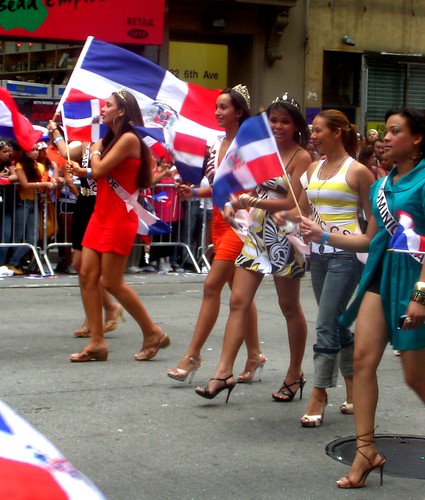
The lazy days of Summer are a good time to read. I had just finished Dr. Juan Bosch's classic "Composición Social Dominicana:História e Interpretación", when I was caught by surprise that a European think-tank had selected Dominicans the second "Happiest People" in the world and Costa Ricans number one. Was there a common bond?
Having just read the book on over 500 years of history picked my interest. What could these two outwardly different countries have in common that a travel agent would not normally place them in the same tour destination, simply for logistical reasons.
With the risk of sounding pretentious, I humbly took on the challenge of finding out what made these two apparently different peoples extraordinarily happy.
And why not, my challenge was stimulated and emboldened by several factors: First, I was fortunate to have studied Latin American anthropology at Mexico's Ibero-Americana University. Anthropologists look at people's real differences which are social customs and habits, not outside skin chromaticity.
Secondly, I felt I had been a witness to history when at the home of Don José Desiderio Ares Maldonado and Doña Clément Guzmán de Ares, I had spent two days informally speaking (or interviewing) the famous Don José Figueres.
Don "Pepe" as the former Costa Rican President was known, had been a house guest of the Ares-Guzman family for the 1978 Presidential inauguration of Don Antonio Guzmán. I studied President José Figueres in College and knew of his great leadership during the 1948 Revolution, and eventually became known as the Founder of the New Costa Rica.
Lastly, I had a more mundane reason. I had spent a year training and supervising Costa Ricans. Unless you know the ropes and look for customs and habits, it's a tough job for anyone; specially for a Dominican from New York as I was. But the same could be true when dealing with the elite of Port-au-Prince who can think of themselves as the "crème-de-la-crème".
Now for similarities. First, Dominicans and Costa Ricans have a mental sense of superiority, false or not, of thinking they live with or their country is filled with "inferior" foreign people.
Ask a Costa Rican the population of their country and they'll answer..."4 million". However, one million of those are illegal Nicaraguans. Ask Dominicans the country's population and you'll get: "10 million... but 3 million are illegal Haitians.
Additionally, inhabitants of their respective Capitals see themselves as highly cosmopolitan. They claim to know New York City better than well-educated middle class New Yorkers with financial means. They'll (try to) challenge you on knowing the best restaurants.
I think it goes back to a "state of mind", the culprit being a Spanish tradition that permeates all Latin America, perhaps more than Madrid itself by having a disdain for manual labor and a thinking of yourself as "Caballero" (Gentleman on horseback). In terms of the wardrobe, male inhabitants delight in wearing suits, which is comfortable in San Jose's weather and uncomfortable yet obligatory in Santo Domingo despite the heat.
Now for the fallacies, and here they have similarities.
Cost Ricans consider their country the 'Switzerland of Central America". They claim no standing Army, yet they have numerous private security services.
Dominicans for years have had no enemy with military might - yet the country maintains a "Cold War" military apparatus.
And lest we forget, the ostensibly pious Costa Ricans at one time had two fugitive ex-Presidents on corruption issues.
Finally, I agree with the study of the New Economics Foundation. Both countries value and care for their environment. Both peoples have an enormous high opinion of themselves, combined with having unwanted illegal neighbors contributing poverty without much intellectual skills. Both countries doggedly compare themselves to the United States, and yes, nature conservation is important, a big plus.
Combine these factors with the Spanish tradition of a "better than thou attitude" man-on-horseback mentality, it all comes down to a state of mind if you "think" you are better than the rest - and you'll be happy- specially when you have poor neighbors to remind you how fortunate you are. Even if you're hungry. Just don't show it.
De José C. Paulino
No comments:
Post a Comment